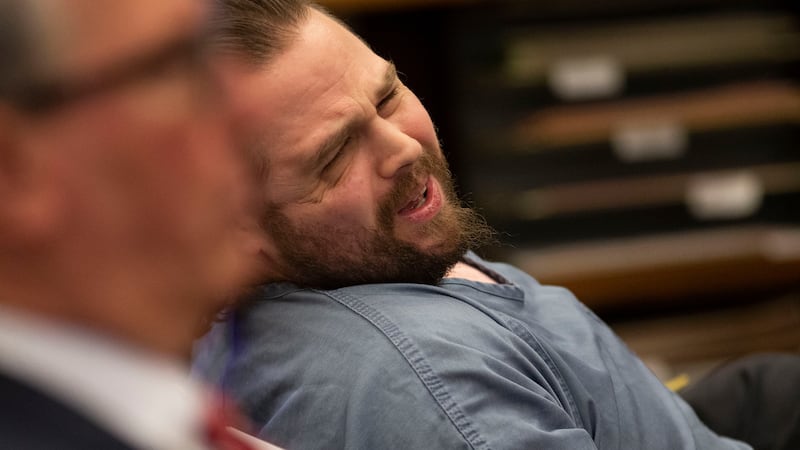A Multnomah County jury has found Jeremy Joseph Christian guilty of the murders of Ricky Best and Taleisin Namkai-Meche, and the stabbing of Micah Fletcher, the three men who interrupted his racist rant on a Portland MAX train in 2017.
The jury deliberated for nearly 12 hours before it reached a unanimous verdict on Friday: guilty on all 12 counts.
Jurors found Christian, 37, guilty of murder in the first degree, attempted murder in the first degree, assault in the first degree, assault in the second degree, intimidation in the second degree, unlawful use of a weapon, and menacing. The verdict was unanimous on all counts.
Family members cried as Judge Cheryl Albrecht read aloud the verdict. Demetria Hester, whom Christian assaulted the night prior to the fatal stabbings, and Shawn Forde, who witnessed the fatal stabbings, held hands as the verdict was announced. Family members let out an audible sigh of relief when Albrecht finished reading the verdict.
Christian remained quiet and stoic throughout, and he was escorted out of the courtroom without incident by Multnomah County sheriff's corrections officers. He wore blue prison clothes, which he opted to wear for the duration of the trial.

Today's verdict marks the end of an emotionally charged four-week trial in which more than a dozen witnesses testified about the events that transpired on the crowded MAX train on May 26, 2017.
There was little dispute about what Christian did: He stabbed three men in the neck, killing two, when they interrupted his diatribe against two black teenage girls, one of them wearing a hijab. The killings were witnessed by a crowd of rush-hour commuters, and captured on video.
But Christian's defense team argued throughout the trial that he was defending himself from a violent attack by people who couldn't tolerate what he had to say, and that he acted in self-defense when he stabbed the three men. His attorneys repeated that contention in their closing argument Wednesday.
"The facts show that Jeremy Christian was physically confronted after exercising his free speech—free speech that everyone hated—and that he was thrown down twice and told to get off the train, and that's the moment that his limbic system took over," defense attorney Dean Smith said. "That's the moment when intent starts to become questionable. That's the moment when self-defense becomes real."
Prosecutors from the Multnomah County District Attorney's Office adamantly disputed this claim. Rather, they argued, Christian planned the attacks beforehand, as evidenced by a similar incident the night before the fatal stabbings in which Christian allegedly threatened and assaulted a black woman on a MAX train.
In its closing Wednesday, the prosecution pointed to Christian's statements after the stabbings occurred, in which he said he appeared to lack remorse for his actions when he told police that he hoped everyone he stabbed died.
"Everything he did, he did intentionally," prosecutor Jeff Howes said during closing arguments on Wednesday. "This wasn't just physical force, ladies and gentlemen. It was deadly physical force."
Howes said that, even if Christian believed he was acting in self-defense, his response to the situation was disproportionate to the actual threat.
"I'll tell you how reasonable people would not react. They would not stab three people in the neck with a knife," Howes said. "There is no equation, no calculation, no justification, no rationalization, that could possibly lead someone to reasonably believe that that is the appropriate response in that situation."
As family and friends of the victims waited for Christian to arrive in the courtroom on Friday afternoon, they appeared anxious. One man asked where a box of tissues was. Another expressed impatience. “Let’s get this done,” he said. “It’s been too long already.”

As the verdict was read, some people in the gallery cried. Fletcher, the surviving victim, wore a black suit to the verdict announcement. He remained still and silent—a kind of mirror reaction to that of Christian.
In the minutes after Albrecht read the verdict, city officials and other observers released statements expressing relief and some closure from one of the most traumatic days in recent civic memory.
Lindsay Schubiner of the Western States Center, a watchdog group tracking extremists, said the events that transpired on the MAX train were emblematic of "the deadly consequences of unchecked hate."
"Christian's claim of self-defense was an insult to the two women he victimized, the person he seriously injured and the memory of the two people he murdered," Schubiner said in a statement. "Video and eyewitness reports leave no doubt of Christian's guilt. He was the aggressor, harassing and threatening his fellow riders while carrying a deadly weapon."
In the hall, Demetria Hester expressed a similar sentiment. Hester was the woman who Christian assaulted on another MAX train on May 25, 2017 the night before the deadly attacks.
As she exited the courtroom, Hester jubilantly shouted in the hallway: "Black Lives Matter!"
This post has been updated.
